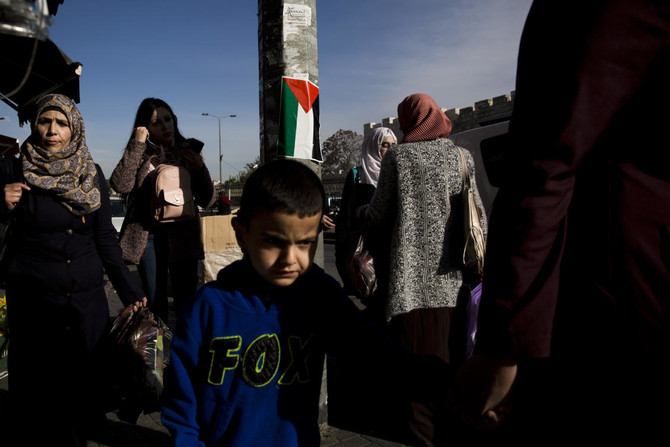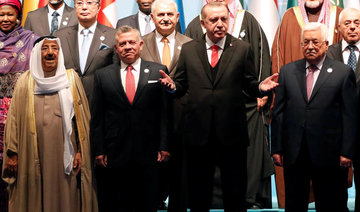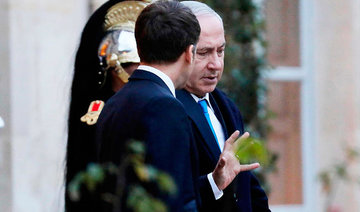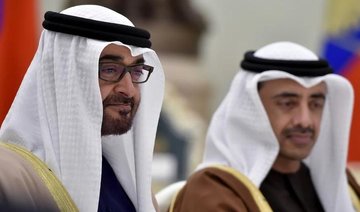JERUSALEM: Pedestrians walk on a thick layer of soot from tires set ablaze in frequent clashes with Israeli troops. Cars navigate around potholes in streets littered with garbage. Motorists honk in a traffic jam near an Israeli checkpoint that is framed by the towering cement slabs of Israel’s separation barrier.
It’s morning rush hour in Ras Khamis, a neglected, restive Arab neighborhood of Jerusalem where President Donald Trump’s recent recognition of the contested city as Israel’s capital has been met by cynicism, defiance and new fears that Palestinians will increasingly be marginalized.
Trump’s pivot on Jerusalem “is regrettable, saddening and unfair,” said Yasser Khatib, 42, who runs a supermarket across the street from the barrier that separates several Arab neighborhoods of Jerusalem from the rest of the city.
Khatib said he has strong religious ties to the city and that his family’s roots go back generations. “We have no life without Jerusalem,” he said as he sold snacks to school children. “Trump can say whatever he wants.”
Palestinians make up 37 percent of Jerusalem’s population of 866,000, up from 26 percent in 1967 when Israel captured east Jerusalem, expanded the city’s boundaries into the West Bank and annexed the enlarged municipal area to its capital.
The international community says east Jerusalem is occupied territory and that the city’s fate must be determined in negotiations with the Palestinians who seek a capital in the eastern sector.
Trump couched his Jerusalem comments — viewed in the Arab world as a show of pro-Israel bias — by saying he is not taking a position on the boundaries of Israeli sovereignty in the city.
Yet he made no specific mention of the city’s large Palestinian population, which could reach 44 percent by 2040, according to the Jerusalem Institute for Policy Research think tank.
Despite Israel’s portrayal of Jerusalem as united, there are stark differences between Arab and Jewish areas after what critics say is half a century of neglect and discrimination.
“On the ground, Israel is not investing much in developing the Arab neighborhoods of Jerusalem,” said Yitzhak Reiter, in charge of the Jerusalem Institute’s mapping of the physical and social infrastructure of Arab neighborhoods.
In many spheres, “the city is still divided, with two different transport systems, two different policies on building and construction.”
Israel would have to invest billions of dollars in Arab areas to reach parity with Jewish neighborhoods, he said.
For now, 79 percent of Arab residents fall below the poverty line, compared to 27 percent of Jews, according to Jerusalem Institute figures.
Welfare services maintain four offices in the Arab east, compared to 19 offices in Jewish areas, said the Association for Civil Rights in Israel. Arab schools have a shortage of hundreds of classrooms, ACRI said. The west has 34 post offices, compared to nine in the east.
Mayor Nir Barkat’s office said he developed a plan “unprecedented in scope and budget allocation to reduce gaps in east Jerusalem” and made progress in alleviating “50 years of neglect” inherited from predecessors. Among other things, the city opened more than 800 classrooms in Arab schools, with 1,000 more in the pipeline, the statement said.
ACRI said the added classrooms included many spaces rented in existing residential buildings.
Jerusalem is the largest mixed city in the Holy Land, and Arabs and Jews interact in daily life, including in malls and hospitals. Many Palestinians work in shops and restaurants in west Jerusalem, typically earning more there than on the east side.
Yet east-west infrastructure gaps remain wide.
Israel may be unwilling to invest heavily in areas that could one day come under Palestinian rule, said Reiter, adding that efforts to maintain a strong Jewish majority may also play a role.
Palestinians claim Israel is trying to drive Arabs out of Jerusalem.
Ziad Hammouri, a community organizer, said Trump’s new position on Jerusalem boosts Israel’s attempts to “control east Jerusalem and to exclude Palestinians from Jerusalem.”
One plan floated by a Cabinet minister — and opposed by Barkat — would place tens of thousands of Palestinians who live inside the municipal boundaries but beyond the separation barrier under a new Israeli-run municipality, thus sharply reducing the number of Palestinians counted as Jerusalemites.
These areas, including Ras Khamis, have seen apartment towers rise in recent years as Israel stopped enforcing building restrictions there.
East Jerusalemites desperate for housing moved there in large numbers, despite fears that they would eventually be “zoned out” of Jerusalem.
On the “Jerusalem side” of the barrier, it’s difficult for Palestinians to obtain building permits, because of lack of outline plans or discriminatory zoning, said Israeli rights groups. Many Palestinians built without permits, and 88 homes were demolished in 2016, the most in a decade, ACRI said.
Barkat’s office said a low share of permit application come from Arab neighborhoods, and that a high percentage of those are approved.
Since 1967, Israel has built large neighborhoods for Jews in the annexed east, now home to 212,000 Israelis.
Palestinian Ismail Siam said a one-story home he built on his land for two adult children was demolished by Israel twice in 14 months, on grounds that he did not have a building permit.
“They want to expel us from the city,” said Siam, 54, standing near patches of floor tiles left from the demolished house.
The plot faces large construction sites for Jewish neighborhoods across a ravine.
Most Palestinians in Jerusalem have residency status.
After 1967, most Palestinians didn’t consider the more secure citizenship option, which would have meant recognizing Israeli rule. In recent years, growing numbers have applied, but increasingly encountered bureaucratic hurdles.
Prolonged absence can put Palestinian residents at risk of expulsion; close to 15,000 have been stripped of residency rights since 1967.
Palestinians in the city can vote in local elections, but have largely refrained from doing so, to avoid the perception that they accept Israeli rule.
East Jerusalem residents also feel increasingly abandoned by Palestinian President Mahmoud Abbas’s West Bank self-rule government. Israel clamps down on Palestinian Authority activities in Jerusalem, limiting Abbas’ influence in the city.
The leadership vacuum was briefly filled over the summer when Muslim clerics led a successful grassroots campaign against metal detectors Israel had installed at east Jerusalem’s Al-Aqsa Mosque compound. Islam’s third-holiest shrine, built on the remnants of Judaism’s holiest site, is a frequent flashpoint of violence.
After Trump’s decision, city residents mounted only small protests, compared to larger marches in the West Bank and elsewhere.
Activist Yara Hawari said rallying large crowds is difficult when there is no narrow objective, such as removing the metal detectors.
“What we are asking is simple, an end to colonization,” she said. “But it’s not as tangible.”
Palestinians, a large Jerusalem minority, feel Trump snub
Palestinians, a large Jerusalem minority, feel Trump snub

Lebanon hopes for neighborly relations in first message to new Syria government

- Lebanon’s Iran-backed Hezbollah played a major part propping up Syria’s ousted President Bashar Assad through years of war
- Syria’s new Islamist de-facto leader Ahmed Al-Sharaa is seeking to establish relations with Arab and Western leaders
DUBAI: Lebanon said on Thursday it was looking forward to having the best neighborly relations with Syria, in its first official message to the new administration in Damascus.
Lebanese Foreign Minister Abdallah Bou Habib passed the message to his Syrian counterpart, Asaad Hassan Al-Shibani, in a phone call, the Lebanese Foreign Ministry said on X.
Lebanon’s Iran-backed Hezbollah played a major part propping up Syria’s ousted President Bashar Assad through years of war, before bringing its fighters back to Lebanon over the last year to fight in a bruising war with Israel – a redeployment which weakened Syrian government lines.
Under Assad, Hezbollah used Syria to bring in weapons and other military equipment from Iran, through Iraq and Syria and into Lebanon. But on Dec. 6, anti-Assad fighters seized the border with Iraq and cut off that route, and two days later, Islamist militants captured the capital Damascus.
Syria’s new Islamist de-facto leader Ahmed Al-Sharaa is seeking to establish relations with Arab and Western leaders after toppling Assad.
Iraqi intelligence chief discusses border security with new Syrian administration

BAGHDAD: An Iraqi delegation met with Syria’s new rulers in Damascus on Thursday, an Iraqi government spokesman said, the latest diplomatic outreach more than two weeks after the fall of Bashar Assad’s rule.
The delegation, led by Iraqi intelligence chief Hamid Al-Shatri, “met with the new Syrian administration,” government spokesman Bassem Al-Awadi told state media, adding that the parties discussed “the developments in the Syrian arena, and security and stability needs on the two countries’ shared border.”
Israeli minister’s Al-Aqsa mosque visit sparks condemnation

- Ben Gvir has repeatedly defied the Israeli government’s longstanding ban on Jewish prayer at the site in Israeli-annexed east Jerusalem
JERUSALEM: Israel’s National Security Minister Itamar Ben Gvir visited Jerusalem’s Al-Aqsa mosque compound on Thursday, triggering angry reactions from the Palestinian Authority and Jordan accusing the far-right politician of a deliberate provocation.
Ben Gvir has repeatedly defied the Israeli government’s longstanding ban on Jewish prayer at the site in Israeli-annexed east Jerusalem, which is revered by both Muslims and Jews and has been a focal point of tensions in the Israeli-Palestinian conflict.
“I went up to the site of our temple this morning to pray for the peace of our soldiers, the swift return of all hostages and a total victory, God willing,” Ben Gvir said in a message on social media platform X, referring to the Gaza war and the dozens of Israeli captives held in the Palestinian territory.
He also posted a photo of himself on the holy site, with members of the Israeli security forces and the famed golden Dome of the Rock in the background.
The Al-Aqsa compound in Jerusalem’s Old City is Islam’s third-holiest site and a symbol of Palestinian national identity.
Known to Jews as the Temple Mount, it is also Judaism’s holiest place, revered as the site of the second temple destroyed by the Romans in 70 AD.
Under the status quo maintained by Israel, which has occupied east Jerusalem and its Old City since 1967, Jews and other non-Muslims are allowed to visit the compound during specified hours, but they are not permitted to pray there or display religious symbols.
Palestinians claim east Jerusalem as their future capital, while Israeli leaders have insisted that the entire city is their “undivided” capital.
The Palestinian Authority’s foreign ministry said in a statement that it “condemns” Ben Gvir’s latest visit, calling his prayer at the site a “provocation to millions of Palestinians and Muslims.”
Jordan, which administers the mosque compound, similarly condemned what its foreign ministry called Ben Gvir’s “provocative and unacceptable” actions.
The ministry’s statement decried a “violation of the historical and legal status quo.”
The office of Israeli Prime Minister Benjamin Netanyahu said in a brief statement that “the status quo on the Temple Mount has not changed.”
UN force sounds alarm over Israeli ‘destruction’ in south Lebanon

- Under the ceasefire agreement, UNIFIL peacekeepers and the Lebanese army were to redeploy in south Lebanon, near the Israeli border, as Israeli forces withdrew over 60 days
BEIRUT: The United Nations’ peacekeeping force in Lebanon expressed concern on Thursday at the “continuing” damage done by Israeli forces in the country’s south despite a ceasefire in the war with Hezbollah.
The truce went into effect on November 27, about two months after Israel stepped up its bombing campaign and later sent troops into Lebanon following nearly a year of exchanges of cross-border fire initiated by Hezbollah over the war in Gaza.
The warring sides have since traded accusations of violating the truce.
Under the ceasefire agreement, UNIFIL peacekeepers and the Lebanese army were to redeploy in south Lebanon, near the Israeli border, as Israeli forces withdrew over 60 days.
UNIFIL said in a statement on Thursday that “there is concern at continuing destruction by the IDF (army) in residential areas, agricultural land and road networks in south Lebanon.”
The statement added that “this is in violation of Resolution 1701,” which was adopted by the UN Security Council and ended the last Israel-Hezbollah war of 2006.
The UN force also reiterated its call for “the timely withdrawal” of Israeli troops from Lebanon, and “the full implementation of Resolution 1701.”
The resolution states that Lebanese troops and UN peacekeepers should be the only forces in south Lebanon, where Hezbollah exerts control, and also calls for Israeli troops to withdraw from Lebanese territory.
“Any actions that risk the fragile cessation of hostilities must cease,” UNIFIL said.
On Monday the force had urged “accelerated progress” in the Israeli military’s withdrawal.
Lebanon’s official National News Agency (NNA) reported on Thursday “extensive” operations by Israeli forces in the south.
It said residents of Qantara fled to a nearby village “following an incursion by Israeli enemy forces into their town.”
On Wednesday the NNA said Israeli aircraft struck the eastern Baalbek region, far from the border.
Syria forces carry out operation against pro-Assad ‘militias’: state media

- Operation had already succeeded in ‘neutralizing a certain number’ of armed men loyal to Assad
DUBAI: The new Syrian military administration announced on Thursday that it was launching a security operation in Tartous province, according to the Syrian state news agency.
The operation aims to maintain security in the region and target remnants of the Assad regime still operating in the area.
The announcement marks a significant move by the new administration as it consolidates its authority in the coastal province.
The operation had already succeeded in “neutralizing a certain number” of armed men loyal to toppled president Bashar Assad, state news agency SANA reported said.
The Syrian Observatory for Human Rights monitor has reported several arrests in connection with Wednesday’s clashes.
Further details about the scope or duration of the operation have not yet been disclosed.




















